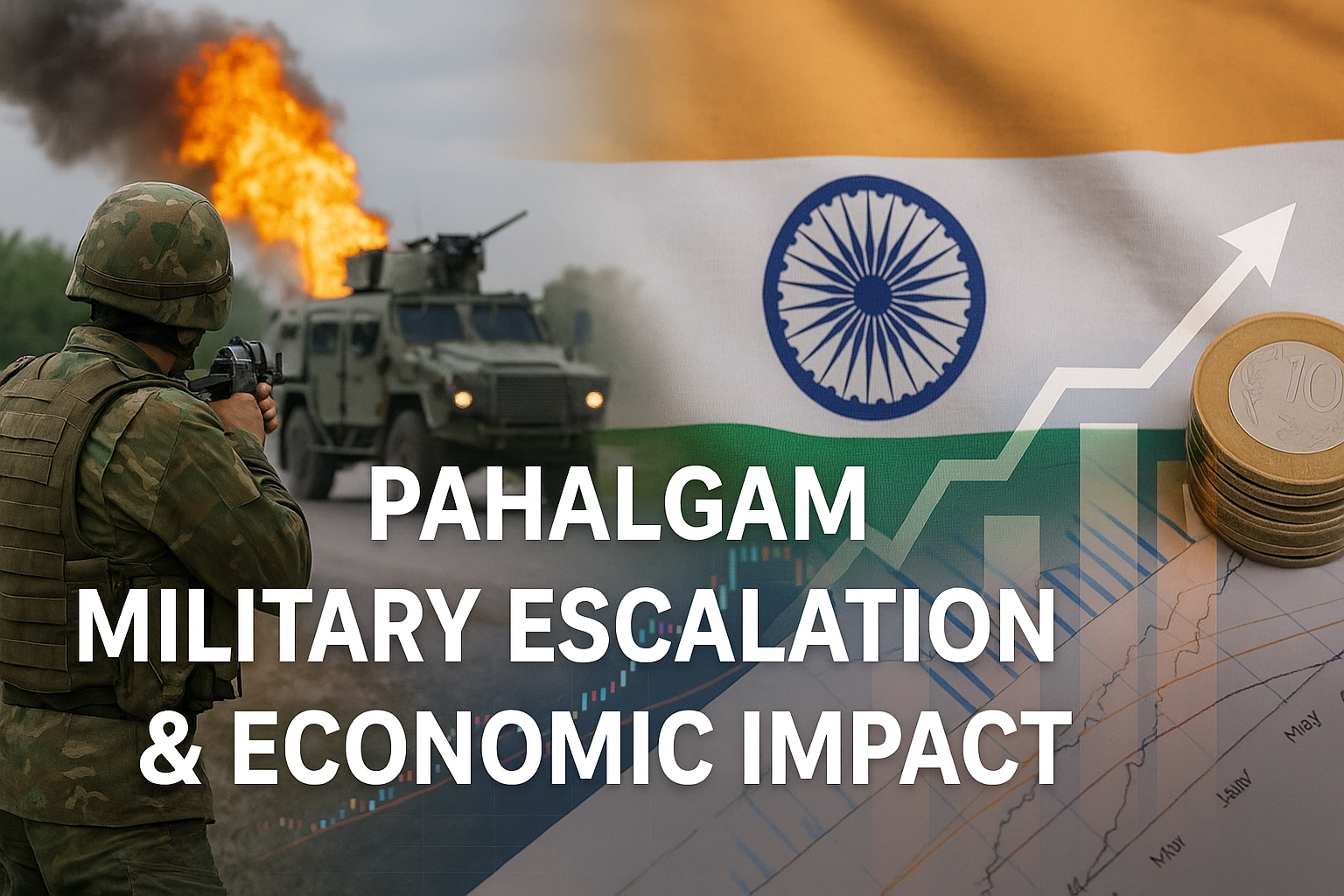Understanding Military Escalation and Its Economic Impact After the Pahalgam Incident
In recent times, India has found itself at a strategic crossroads. After the unfortunate terrorist attack in Pahalgam, where brave Indian soldiers lost their lives, questions of military response and its broader economic consequences have taken center stage. But what really happens when a country decides to respond with force? And what are the ripple effects—military, political, and financial?
Let’s unpack this complex situation in a way that’s easy to understand, yet still covers the deep issues at play.
What Happened in Pahalgam?
Before diving into broader topics, let’s revisit the incident. In March 2024, a deadly terrorist ambush in Pahalgam, Jammu & Kashmir, claimed the lives of Indian soldiers. This wasn’t just a random act of violence—it was a calculated strike designed to provoke India into reacting. Events like these often act as a trigger for larger political and military moves, and that’s exactly what we’re seeing now.
Military Escalation: What Does That Even Mean?
Military escalation refers to how a country responds—militarily—to threats or attacks. There are different “levels” of escalation, often referred to as an escalation matrix. This matrix helps leaders decide:
- When to respond militarily
- How to respond (airstrikes, ground forces, cyber warfare, etc.)
- How far to go without risking a full-blown war
The higher up you go on this matrix, the more serious the consequences become—not just militarily, but economically and diplomatically too.
Strategic Thinking After Pahalgam: Retaliate or Restrain?
After such a painful attack, public pressure to strike back is enormous. But major decisions like these aren’t just emotional—they involve logic, timing, and long-term strategy. So India faces a big question:
Should we hit back hard, or hold back and plan something smarter?
The answer isn’t easy. While a strong military response could satisfy national sentiment and serve as a warning, it could also spark a dangerous chain reaction. Think of it like throwing a stone into a calm lake—ripples spread out quickly, and you can’t control where they go.
The Dilemma of Direct Military Actions
Let’s say India decides to launch an airstrike across the border. Sounds decisive, right? But here’s what else can happen:
- Pakistan might retaliate immediately, escalating tension between two nuclear-powered neighbors.
- International powers could urge both countries to “de-escalate,” potentially limiting India’s strategic advantage.
- Markets may react negatively, fearing regional instability.
Remember what happened after the Balakot airstrikes in 2019? The sense of victory was high, but it led to serious diplomatic strain and military standoffs. History tells us that direct military retaliation comes with heavy baggage.
The Economics of War: What It Means for Everyday People
War is expensive—really expensive. Even the smallest military action costs millions. And that’s just the tip of the iceberg.
So how does a military escalation impact the economy?
- Defense spending goes up—money that could have gone to healthcare, education, or infrastructure is redirected to defense.
- Stock markets tend to tumble due to increased uncertainty and instability.
- Tourism and investment slow down in regions near conflict zones, affecting local economies.
- Inflation may rise as fuel and commodity prices get affected by strained international relations.
In short, while military action might feel like the right thing emotionally, it can shake the very foundation of a country’s economic health. And guess what? It’s the common people who bear the brunt.
The Role of International Diplomacy
One powerful response that often gets overlooked is leveraging diplomatic channels. When a nation condemns an act of terror and rallies international support, it can actually isolate the perpetrators more effectively.
Through diplomacy, India can:
- Make sure the world holds nations accountable for harboring terrorists
- Apply economic and political pressure without risking open war
- Build long-term alliances that strengthen our national security
Think of diplomacy as the quieter, more strategic chess move—it doesn’t make headlines like an airstrike, but it often has lasting impact.
A Middle Ground Approach: Covert Operations and Cyber Capabilities
If open war is too risky and doing nothing isn’t an option, what’s the answer?
Many believe the solution lies in hybrid warfare—a mix of intelligence operations, cyber attacks, and limited tactical missions to neutralize terror networks discreetly. These actions don’t draw the same global attention as bombings or troop deployments but often achieve better results without creating chaos.
India already has advanced capabilities in these areas. A focused approach could serve as a powerful message without destabilizing the region.
Learning from Past Conflicts
Looking back at wars like Kargil, or even recent global conflicts, one thing is clear: wars are easier to start than to finish. They drain not just lives, but economies, morale, and international goodwill.
It may help to think of conflict as a fire. We may want to respond with fire of our own—but sometimes a better tool is water, or better yet, fireproofing the house in the first place.
Wrapping It Up: Choosing Smart over Swift
The Pahalgam incident was heartbreaking and infuriating. But as a nation, our response needs to be guided not only by emotion, but by strategy, foresight, and a broader understanding of what’s at stake.
In today’s world, military escalation isn’t just about boots on the ground or jets in the sky. It’s also about economic strength, diplomatic alliances, and smart, targeted responses. Every decision at this level carries a cost—not just in money, but in global reputation and long-term peace.
Final Thoughts: What Should We, as Citizens, Expect?
As citizens, it’s natural to feel a sense of patriotic pride and anger—but we must also ask the hard questions:
- Is this response going to make us safer in the long run?
- Will it help prevent future attacks?
- What are the economic trade-offs?
The military, government, and strategic experts all play a role in crafting India’s next steps. But staying informed and thoughtful helps us all play our part in fostering a future that’s safe, strong, and smart.
If you found this breakdown helpful, share it with someone who’s curious about the intersection of national security and the economy. Let’s keep the conversation going.
- Military escalation strategies
- India-Pakistan conflict
- Post-Pahalgam military response
- Economic impact of war in India
- Diplomatic strategy against terrorism
- India national security policy




